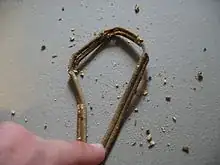Heat and thermal stress, even at engine bay temperatures, is not generally the cause of copper wire failure. There is "hydrogen embrittlement" for copper but that only really comes into play at 400C+ in hydrogen-rich environments, usually during annealing. Also, the 20-30C higher range from your hotter climate is pretty negligible from copper's point of view.
Copper's linear thermal expansion coefficient is roughly 17 micrometers / meter / degree C (off the top of my head, you can look it up though). It's very negligible in the lengths found in most wiring applications and especially negligible when the wire is just hanging there with plenty of space to expand/contract without inducing mechanical stress.
Copper is also specifically chosen for wiring because of its high tensile strength and great durability, not just its high electrical conductivity. Aluminum, for example, is a lot cheaper, makes perfectly fine wiring, but has a lower tensile strength and higher thermal expansion coefficient, meaning extra care needs to be taken to managing it (aluminum's big advantage is cost and weight; they use it in a lot of long distance overhead wires).
Copper also has a high thermal conductivity, meaning "hot spots" in wires tend to even out quickly, reducing internal stresses due to uneven expansion. It also has a fairly high resistance to corrosion from environmental factors like moisture and oxygen, although of course it is not immune and this can be an issue over time.
In a way, copper is the solution to the types of stresses that wiring generally undergoes in an environment like an engine bay.
The primary failure modes of wiring are usually:
Insulation failure: Cracking insulation leading to shorts that can get hot enough to melt copper. Insulation failures can be caused by heat, UV, environmental factors and degradation, etc.
Galvanic corrosion at connection points: Aluminum, steel and zinc will generally corrode when in electrical contact with copper. Copper will generally corrode when in contact with stainless steel or brass. This can weaken connections over time.
Oxidation: While copper is pretty resistant to oxidation, it still happens over time (e.g. the Statue of Liberty is green, and you can certainly spot lots of corrosion in exposed copper wires in aging vehicles) (actually copper oxides aren't green but ultimately they turn into green copper carbonates/sulfates like malachite and such). The corroded copper is much more brittle than the metal. Obviously, wiring with more surface area, such as stranded wiring, will have a bigger issue. Also if the insulation is cracked or permeable to oxygen, that's another potential source.
Edit - I guess mechanical fatigue is worth mentioning too, perhaps due to past abuse during maintenance or fatigue due to vibrations in really unfortunately placed wiring. Copper's pretty resilient to this but certainly not immune.
Oxidation is probably the issue that'll cause you the most problems over time.
So from all that I would say:
- Manufacturers are already doing the right thing just by using copper to begin with.
- You might be able to slow it down by e.g. spraying good insulation onto exposed points but... there may not be much to improve.
- In a vehicle that already has heavily corroded wiring there's nothing you can do to reverse it.
- Get used to old wiring breaking as a fact of life and budget time for wiring replacements after a visual inspection of the state it's in.
- Using thicker wire wouldn't hurt but may not help. More importantly, use wiring with good, flexible insulation rated for outdoor environments and engine bay temperatures. Silicone is a good choice.
